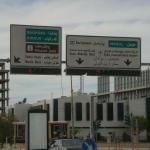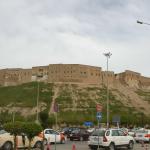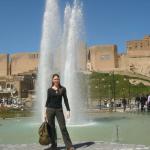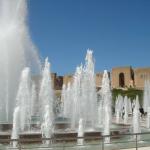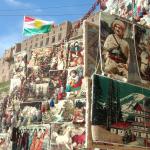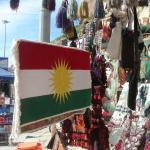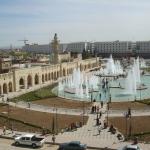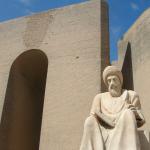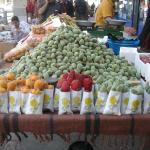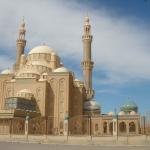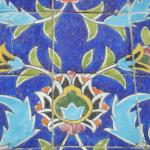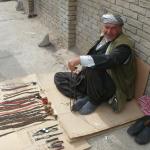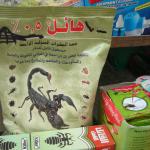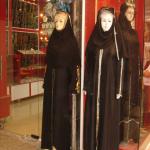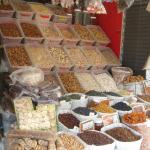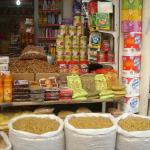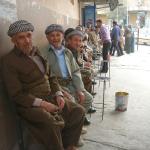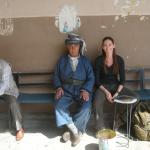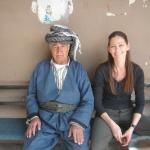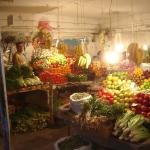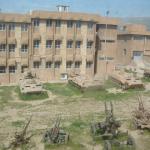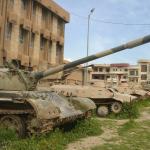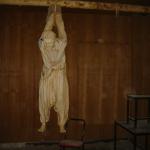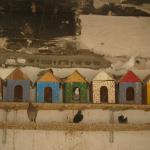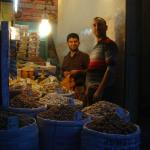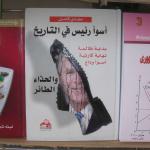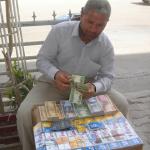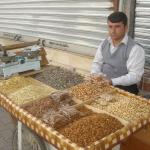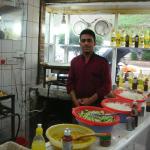© 2011 Sabrina Swenson. All Rights Reserved.
Iraq
March, 2010
"Why in the world do you want to go there?" I was asked this question many times before my departure for Iraq. My answer.. "because it's there and because I can!" I was in the Northern Kurdistan region of the country, mind you, known as "the other Iraq". This area is fairly safe compared to the Southern Arab region which as you know (unless you've been a hermit for the past 7 years) is a hotbed of atrocities.
Getting a flight and visa for Iraq was surprisingly simple. Austrian Airlines fly four times a week from Vienna to Erbil. Americans receive a free ten day visa upon arrival. This all sounded too easy and so I called the Iraqi Embassy in Washington, DC. They confirmed that Americans along with several other nationalities do indeed receive free10 day visas upon arrival. They stated this visa was for the Iraqi Kurdistan region only but I would learn later (after venturing into Arab, Iraq briefly) that this was not strictly enforced. And so, equipped with nothing but my small backpack and curiosity, I headed to Iraq...
Iraqi Kurdistan is a secular society (meaning religion and government are separate) and so there was no need to cover my head. I saw some women in the all encompassing chador, some with only a scarf over their head and some, in the more modern city of Sulaymaniyah, in tight pants, tight tops and heels!
The first thing that struck me upon arrival was the "normalcy" of life. I hopped in a taxi and headed for the center of town. I had the driver drop me off by the main attraction of Erbil; the citadel. After checking out a few hotels I found one with a room. These were hotels of the 3rd world variety; no beauties but perfectly adequate for my needs. The owner of this hotel didn't speak English but called a friend from next door who came over to translate. This kind man, with his excellent English, would help me on a few occasions throughout my stay. In the Kurdistan region of Iraq people speak Kurdish, many also speak Arabic but few speak English.
After walking around the city for a bit I first noticed a disproportionate ratio of men to women. It was about one hundred men for every one woman I saw. I later learned that there is not some freakish man to woman ratio but rather, most women were tending to the home or taking care of the children. I first checked out the citadel which was perched high on a hill overlooking the city. This place was huge and has been continuously inhabited for the past 8,000 years. It looms over the city and with it's enormous size and position on a hill it is impossible to miss from anywhere in Erbil. After, I headed to Erbil park, a beautiful tranquil spot filled with fountains, lakes and gardens which was built over what used to be Saddam's feared 5th Army Corp. military base. The Kurds have done a wonderful job of creating something beautiful over what was once something so heinous. After strolling around the vast park I picked a spot at an outdoor restaurant to watch the sun set and ordered something to eat and a beer. I had to do a double take. Was that really a Miller Genuine Draft made in Milwaukee, WI that they just put in front of me. Why, yes it was! In the peace and quiet with a cold Miller in front of me, it was hard to believe I was in Iraq. "The other Iraq" is aptly named. It was hard to believe just a short distance South of here a war has been raging for years.
After my meal a young girl approached my table and asked if her father could come and practice English with me. I agreed and she and her young father sat with me. He was a high school teacher from a town in Kurdish Iran and he spoke of how he and his family had come to Iraqi Kurdistan for holiday so that they could be free. I thought this was a strange statement but came to learn that by comparison, of all the Kurdish regions (which cover parts of Iraq, Iran, Syria and Turkey) the one in Iraq is the freest. He told of how he was forbidden to speak Kurdish to his students in his town but rather was required to speak Farsi; the language of Iran. He told of the freedom they felt visiting Iraqi Kurdistan.
Throughout my visit, upon people hearing that I was American I would inevitably get a smile, the thumbs up and an "America good!" All this positive feeling towards the US was in contrast to several other countries I have been where, unfortunately, the opposite reaction is often the norm. People were paying for my taxis, food, coffee, tea and giving me bottles of water. (In a 3rd world country like Iraq where the local water should not be drunk, bottled water is a precious commodity). I tried to decline all these offers of hospitality, but it was futile. They simply insisted. Americans are seen as liberators in the Kurdistan region. In 1991 the US military imposed a no-fly zone to protect the long oppressed Kurds from Saddam's brutal regime. This was formalized in 2005 when the new Iraqi Constitution recognized Iraqi Kurdish sovereignty. The Kurdistan red, white and green stripped flag with a huge yellow sun is proudly flown all over the region.
After a couple days I headed West to the smaller city of Dohuk. This was my favorite place in the region. I obtained a shared taxi (meaning every seat is sold before you head off) and 2 1/2 hours later arrived in Dohuk. Like other areas of Kurdistan, there were many men dressed in the traditional Kurdish dress. The Kurds are very friendly and readily accepted my request for pictures. I checked out the bazaar; a traditional old market with a maze of alleyways and colorful stalls selling any and everything you could think of. I truly dislike shopping but enjoy wandering around these kinds of markets. The bazaar was massive and I easily spent a few hours in it.
After Dohuk I decided to head to the city of Sulaymaniyah. Again, I hired another shared taxi to take me back to Erbil. Erbil is in the middle of Kurdistan and inevitably the point from which you get anywhere. I then hopped in another shared taxi to Sulaymaniyah. There are two ways to get there from Erbil. The first goes the Northern route staying the entire time in the Kurdish region. The second route, slightly shorter, goes South and dips briefly into Arab Iraq around Kirkuk before heading North again into the city. I specifically stated to my driver that I did NOT want to go via Kirkuk.... NOT. It is simply not a good idea for an American civilian to be in Arab Iraq. He nodded his head profusely and I got in. When driving in the Kurdistan region there are road checkpoints about every 20 miles or so that you are required to stop at. Some checkpoints they simply wave you through. Some they asked for ID from everyone in the vehicle and sometimes ID just from me (always the only foreigner and woman in the car). Occasionally I had to have my bag checked. As we were on our way to Sulaymaniyah I all of a sudden saw a huge check point coming into view with signs in Kurdish and English stating no pictures, no cellphones, etc. This checkpoint was massive compared to the others we had stopped at. As we pulled over they asked for our IDs. They looked at mine and called over a few more guards. One in English stated "we have an American!". I was then asked to get out of the car and walk over to a different area. Upon rounding a corner I saw four American soldiers in full gear. They asked what I was doing there and I realized immediately, this was the road to Kirkuk and Arab Iraq! I told them of how I specifically told my driver I did NOT want to go via Kirkuk but that obviously we had a communication problem. When one soldier asked who I was traveling with I indicated I was in the shared taxi with the driver and 3 guys. He said "you're traveling alone!". "Yep!" I responded. We chatted a while and they were kind enough to take down my info as well as the driver's name, number and license plate number. Their interpreter told my driver to take care of me. He, in turn, relayed that we were only going around the city of Kirkuk and eventually back into the Kurdish region for the rest of the trip. And so, after putting a big black scarf over my head and with a wave from the soldiers, we headed into Arab, Iraq. The first thing I noticed were lots of things burning. Since no one in the car spoke English I'm still wondering what it was. Black plumes of smoke were wafting into the air from numerous locations. We drove without stopping and eventually crossed back over into the Kurdistan region.
Once in Sulaymaniyah I immediately headed for Amna Suraka (Red Security). Under Saddam's regime this was the Northern Headquarters of the Iraqi Intelligence Service. Thousands of people (mostly Kurds) were imprisoned and tortured here. In 1991 the prison was liberated. In 2003 it was decided that it would be turned into a war crimes museum. My guide book stated this was a place visitors would find disturbing and hard to forget; they were right. The exterior was kept just as it was burnt out, bullet holes and all. Huge tanks, artillery, mortars and other weapons were in the courtyard. The most disturbing, I found, were the prison cells and torture chambers. A local artist has made life size sculptures which are in a few of the rooms showing varies tortures used. Equally gruesome was the basement which showed pictures of the aftermath of Saddam's chemical attack on the city of Halabja. On May 16, 1988 Saddam's military dropped a weapon that smelled of sweet apples over the city of Halabja; chemical weapons. Within 30 minutes 5,000 people were dead and over 7,000 injured. The pictures show in great detail the after effects. It was hard to walk away from this place untouched. Only the coldest of souls, I would imagine, could do so. After thinking about these kinds of places and what they represent I feel that I have nothing to complain about... ever! After seeing things like this, I feel ashamed whenever I catch myself complaining about something trivial or petty...
After Sulaymaniyah I headed back to Erbil and then onto the Iranian boarder town of Haji Omaran. Once again I told my new driver I wanted to go the Northern route and stay in Kurdistan. Again, I received much nodding of the head but once more as we drove, I saw a huge checkpoint in the distance. I just shook my head and grabbed the scarf as we approached. Once the scarf was in place over my head and with my sunglasses on as protection from the blazing sun, upon being stopped we were immediately waved through. Apparently this time I had passed as an Iraqi woman. As we drove by the checkpoint I saw four other American soldiers at this end. I hoped this venture through the Arab region was just as hasty as the first. It was and we were soon enough back in Kurdistan. With this, the scarf came off and once back in Erbil I hired a private taxi to Haji Omaran. I chose to head this way as the road passes through beautiful Gali Ali Beg canyon and a waterfall. The road also, as it inched closer to Iran, had a great view of the surrounding snow capped mountains. Again, road checkpoints are everywhere and as we approached the last two before Haji Omaran (and the Iranian boarder) we were stopped and I was made to go inside the checkpoint. The second to last checkpoint wanted to know where I was headed. They repeatedly indicated I should NOT cross into Iran under any circumstances. I had actually briefly thought about going however just as quickly decided against it after remembering that President Ahmadinejad is not all too keen on America at the moment. That, along with the fact three Americans have been imprisoned in Iran for over a year for supposedly crossing over into Iran whilst hiking in Kurdistan near the boarder persuaded me to pass on the opportunity. I guess that trip will have to wait a while; perhaps a long while. I assured them I was not going into Iran but rather I just wanted pictures of the surrounding mountains. With that we were given the OK to leave and we continued on. At the last checkpoint before the boarder we, once again, were required to go inside the checkpoint building. Again the guards wanted to know where I was going. I told them just to Haji Omaran for some pictures and then back to Erbil. I was told once again under no circumstances should I cross into Iran. This was punctuated by the man in charge drawing a line across his throat. I understood this most clear of warnings and after he was satisfied with my understanding (and now with business out of the way) as if flipping a switch, he was all of a sudden all smiles and with a yell of "Obama" he and all the other guards stood and suddenly all wanted pictures with me. Once this photo op was over, my driver and I were back on the road. The surrounding mountains were beautiful but as we pulled into Haji Omaran I somehow felt as though I had been transported to a remote Siberian village. There was a blanket of snow and burnt out trucks littered the road. Mass amount of trash swirled in the wind. For one of the busiest boarder crossing between Iraq and Iran as well as a major point of legal and not-so-legal trade this place seemed to be dead on this day; at least severally depressed. I now understood why the guards all wanted to know why I wanted to come here. Other than the beautiful surrounding mountains there was no reason what-so-ever to stay here. With a quick drive through the town my driver and I turned around and headed back to Erbil. This time, headed in the opposite direction of Iran, we were simply waved through all the checkpoints.
Upon reaching Erbil for the last time, I encountered a problem I had not before. There were no rooms to be had in the city. I went back to the original hotel I had stayed at on my first days in Iraq and the kind man next door came over to translate. I just assumed there would be a room available and when he said there was not I asked "are you sure you don't have any room"? He translated, paused a moment and then asked "any room", yes I said "any room". He grabbed a key and said "follow me". The fact that he did not elaborate on this should have told me about the state of the room I was about to be shown. As he opened the door (which was padlocked shut) a small room that appeared to be the home of the man who ran the hotel appeared; and this man was not tidy! There were man clothes strewn about the room, food, a hot plate, curtains hanging on two crude nails hammered into the wall, a small TV and two single beds. One bed was full of crap; boxes, papers, more man clothes and an assortment of accoutrement's, etc. The other bed with sheets and blankets askew looked as though the man had literally just crawled out of bed moments earlier. On top of this there was an overwhelming smell of man, and not in a good way! Think cheap aftershave and a sweaty head. I found it funny that he didn't apologize for the state of the room nor was there any attempt to tidy it up, but rather, it was to be rented..... "as is". I tried to smile and act as if nothing were amiss as I slowly backed out of the room. I indicated I may just have a look around town a bit but might return if I didn't find anything else. As I turned my back to leave I thought "there's no way in hell I'm staying there!". Unfortunately, after a long hour and a half in the rain and 13 hotels later, upon learning it was a holiday and that all the Iranians were in town (therefore occupying all the hotels) I wearily schlepped back to the original hotel looking like a drowned rat and cringing at where I would be laying my head that evening. At least they only charged me $8 for the nest. Luckily, I always travel with a silk sleeping bag liner and this would be my clean cocoon for the night. I did wake in the middle of the night though to find my head not on my silk liner but instead directly on the man's pillow.... yuck! The shared bathroom down the hall was no gem either. It contained a squat toilet (standard for this part of the world) but no shower or sink. I gagged slightly as I brushed my teeth with a bottle of water over a dirty drainage hole in the floor.
The next day I had my breakfast, which usually consisted of fresh bread, cheese and some excellent coffee. All this could be had for under a buck. I finished and then wandered around the city one last time before heading back to the airport. After three bag checks, three magnetometer checks and three very up close and personal pat downs I was allowed on the plane back to Vienna and eventually Frankfurt. Although I have no doubt many terrorists can be found in Iraq, the Kurdish region is a breath of fresh air. The people were lovely, helpful and generous. They went out of their way to help a foreign solo traveler. They truly have given their region a positive name. I will remember my time there fondly.

